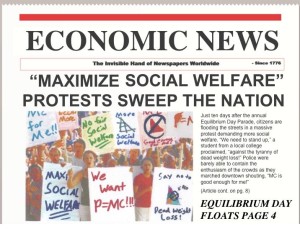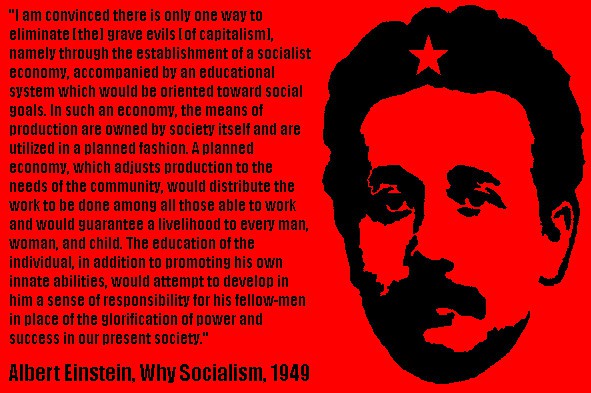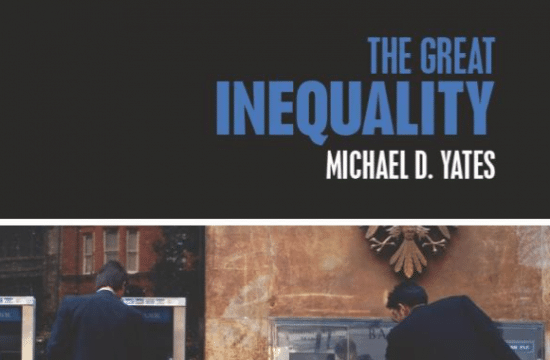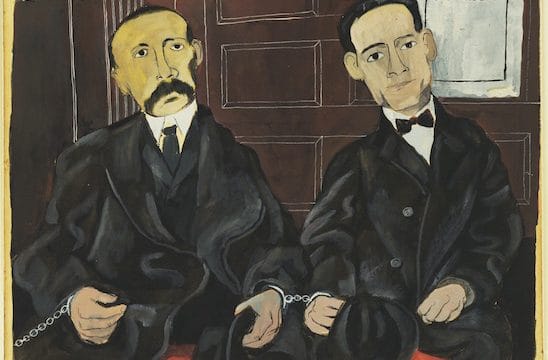 The name, “Nobel Memorial Prize in Economic Science,” tells us that those who give the prize believe that economics is a science. This is certainly what my professors thought when I was a student. One argued that every good economist is a good physicist. There was even a joke that an exceptional economist who dies is reincarnated as a physicist, while a mediocre one comes back as a sociologist.
The name, “Nobel Memorial Prize in Economic Science,” tells us that those who give the prize believe that economics is a science. This is certainly what my professors thought when I was a student. One argued that every good economist is a good physicist. There was even a joke that an exceptional economist who dies is reincarnated as a physicist, while a mediocre one comes back as a sociologist.
Mainstream, or neoclassical, economics, whose practitioners have won almost all of the Nobels, begins with a fundamental idea: the economy is best conceived as a set of markets in which buyers and sellers act solely out of self-interest, each trying to maximize his or her well-being. In the labor market, for example, employers are assumed to be profit maximizers, while employees are presumed to allocate their time between work and “leisure” so that they gain as much “utility” or “satisfaction” as possible. Each actor in the marketplace faces constraints of one kind or another, and each takes these constraints as a given, making choices within them so as to make their total profits or “utility” as high as possible.
We can apply this simple notion to many situations. Here is one. Judge for yourself if you think this is scientific reasoning.
Let us imagine a man making a certain type of labor market decision. Assume, as does the neoclassical economic scientist, that he has complete knowledge of the wages and benefits associated with every occupation he is considering entering. He also knows what it will cost him in terms of schooling and training to be eligible for employment in each occupation, as well as the income he will have to forego by not working while he is getting the necessary schooling and training. Any particular disamenities of an occupation, such as physical danger, are also known as are their costs. Given these considerations, what will he do? He will assess the costs and benefits of each occupation and choose the one for which the difference between the two is the largest. Implicit in this scenario is a wage for each occupation that at least covers the cost of entering it. Competition in the marketplace will, in fact, make the wage just equal to the entry cost. An occupation with a wage higher than the entry cost will attract new applicants; this will put downward pressure on the wage and upward pressure on the costs (as more people demand schooling and training); and eventually, the above average wage-cost difference will disappear.
The implication of this theory is not intuitively plausible. It is that, while some workers earn higher wages than others, higher wages must reflect higher entry costs. In a sense, then, a doctor is not really better off than a motel room cleaner; in terms of wages minus costs, they are in exactly the same position. Voilà! At least as far as labor income is concerned, there can be no inequality.
Physics, anyone?








Incorrect assumptions: Complete knowledge. Buyers act out of economic self-interest. Actors maximize rather than satisfice. Linear rather than curvilinear functions (thereby ignoring Lorenz’s ‘butterfly’ effect). ‘Ceteris paribus’ (‘other things equal’). Some of these are being addressed by ‘behavioral economics’ which is empirically based on real human behavior(s) rather than the ‘rational man’ assumptions. Others (e.g. the butterfly effect) mean that prediction is theoretically impossible in dynamic (i.e. real world) situations. Cf. “The Black Swan”(N. Taleb, 2007) and “The Poverty of Historicism” (K. Popper, 1957)
Tom, my post is based upon a longer essay I wrote, titled The Great Inequality, which is at http://monthlyreview.org/2012/03/01/the-great-inequality. This article, in turn, is an interrogation of Eric Schutz’s Inequality and Power: The Economics of Class. Take a look at this book. It reflects my view of how economics should be done.
The classic defense of the the type of theory that Michael is describing was Milton Friedman’s Essays in Positive Economics. Here is a link to an an excerpt where Friedman defended the use of unrealistic assumptions in economic theory.
http://www.marxists.org/…/philosophy/works/us/friedman.htm
A few years bac, Mike wrote a review of several books that skewered different aspects of neoclassical economics, including its theory of wages.
https://cheapmotelsandahotplate.org/2011/06/14/the-emperor-has-no-clothes-but-still-he-rules-three-critiques-of-neoclassical-economics/
Uhhhhhh…wages don’t solely reflect entry costs. In fact, those costs are a trivial consideration in the decision whether to take or reject a job. What matters is earning potential in the future. Also, the wage a given job pays more reflects the difficulty of the job and/or the qualifications/skills needed to perform it; the latter are not the same as “entry costs” at all.
Neoclassical economics isn’t dead simply because your professor gave you a B-minus for the course. It has needed modification because of the truths imparted by behavioral economics, which states that “rational economic man” is a fiction. That doesn’t invalidate the basic tenets of economics, though; it merely necessitates the redefinition of some terms.
Joe, you don’t have the argument down properly. Maybe you didn’t take that advanced course. Check out the book that is linked, by Schutz.
I’ve already read the book, and unfortunately, while its premises are interesting, the author’s thought processes are tainted by the (very popular and populist) assumption that economic inequality is a vewy vewy bad thing, as Elmer Fudd would say, when the reality is that a far-left utopia wherein everyone was perfectly equal in a economic sense would be a perfect hell on earth. What seems to produce the greatest human happiness is a narrowing of the range between richest and poorest (as in many Scandinavian countries), but that CANNOT be brought about by Marxist revolution or any of its inheritors. When you kill all the rich people, all you do is redefine what “rich” is, setting up the next round of killing. Those seeking “social justice” for the poor (whatever their definition of that is) ignore the fact that such justice has to apply across the entire spectrum, i.e., for those nasty filthy no-good evil bastard rich people too! (Yes, I doth blaspheme.)
What a silly argument this is. Socialism does not require that every person is “perfectly equal in an economic sense”. It is based on democratic control of production and the societal surplus product, and production for the purpose of meeting humanity’s needs and legitimate aspirations. Relative equality of income distribution would be a consequence; it is not the premise of socialism. Nor is it apparent why economic equality would be a “perfect hell on earth”. The hellish conditions are already present, and increasing, in the current situation of worldwide capitalist domination. Nor is socialist revolution primarily a matter of “killing all the rich people”. It is primarily a political movement of the working class to seize control of the means of production and state power. Most of the violence is perpetrated by the ruling classes upon the revolutionaries — in periods of decay and breakdown, violence is still the strong card wielded by the rulers. Mr. Shiabotnik is arguing from a scholastic, but simple-minded, set of conceptions that he takes as axiomatic, ignoring actual history as well as what Marxists in fact advocate. He himself is operating on the intellectual level of Elmer Fudd.